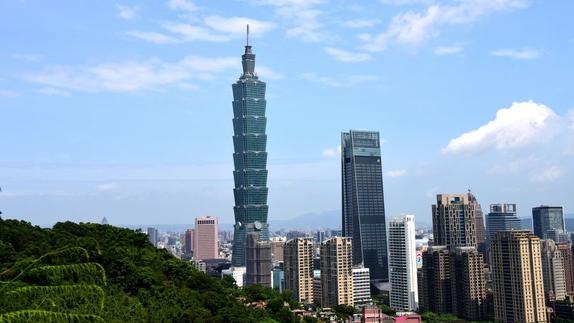 This undated photo shows the Taipei 101 skyscraper in Taipei, Southeast China's Taiwan. (PHOTO / XINHUA)
This undated photo shows the Taipei 101 skyscraper in Taipei, Southeast China's Taiwan. (PHOTO / XINHUA)
BEIJING – The two sides of the Taiwan Strait can resume negotiations as long as the Taiwan authorities recognize the 1992 Consensus embodying the one-China principle, a senior Chinese mainland official said on Friday, as calls are growing for normal exchanges across the Strait.
Song Tao, head of both the Taiwan Work Office of the Communist Party of China Central Committee and the Taiwan Affairs Office of the State Council, made the remarks at a symposium in Beijing to commemorate the 30th anniversary of the Wang-Koo Talks.
In April 1993, Wang Daohan, then head of the mainland's Association for Relations Across the Taiwan Straits, and Koo Chen-fu, then chairman of the Taiwan-based Straits Exchange Foundation, held a productive meeting in Singapore, establishing institutionalized mechanisms for contact and consultation between the two sides.
READ MORE: Reunification the only way out for Taiwan
The Wang-Koo Talks were the first high-level meeting since 1949 between the mainland and Taiwan in the name of the authorized nongovernmental organizations, marking an important step forward in cross-Strait ties.
Compatriots on both sides are all Chinese … The Taiwan question is our domestic affair, and to solve it, the best way is to sit down and talk together.
Lee Cheng-hung, President, Association of Taiwan Investment Enterprises, China
Song said the historic meeting opened a new stage of cross-Strait relations, moving from confrontation to dialogue and cooperation, and showed that the two sides could resolve differences through communication. This still enlightens cross-Strait relations today and will do so in the future, he added.
The past 30 years have shown that the 1992 Consensus is the political foundation for the development of cross-Strait relations and the anchor for peace and stability across the Strait, he said.
In addition, more people from different walks of life in Taiwan are calling for adherence to the consensus, reflecting the aspirations of Taiwan compatriots for the peaceful development of cross-Strait relations, Song said.
Resuming cross-Strait exchanges and normal personnel exchanges is the common wish of both sides, and it is also an urgent need for development of cross-Strait relations, he said.
The mainland will continue to promote normal exchanges, improve policies benefiting Taiwan residents, and support the sharing of opportunities created by the mainland's development.
Lee Cheng-hung, president of the Association of Taiwan Investment Enterprises on the mainland, said at the symposium that businesspeople from Taiwan are more deeply aware of the benefits that peaceful cross-Strait relations have brought to people on both sides.
"Compatriots on both sides are all Chinese," he said. "The Taiwan question is our domestic affair, and to solve it, the best way is to sit down and talk together."
ALSO READ: PLA follows, monitors US Navy plane's Taiwan Strait flight
Lo Chi-san, who is from Taipei, and who quit his job to seek opportunities in Beijing 11 years ago, said, "I deeply feel our motherland's love and care for us Taiwan compatriots."
Lo, who married a local on the mainland and leads a team composed of members from both the mainland and Taiwan, said he witnessed how closer cross-Strait integration brought more convenience and benefits to Taiwan people on the mainland.


